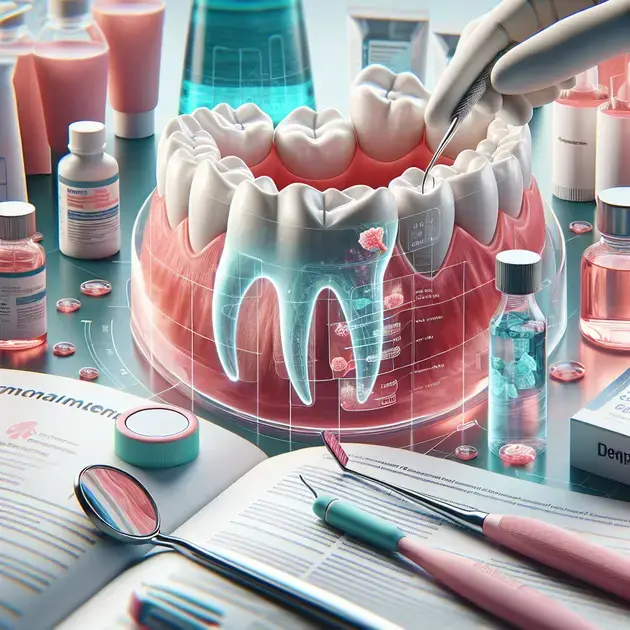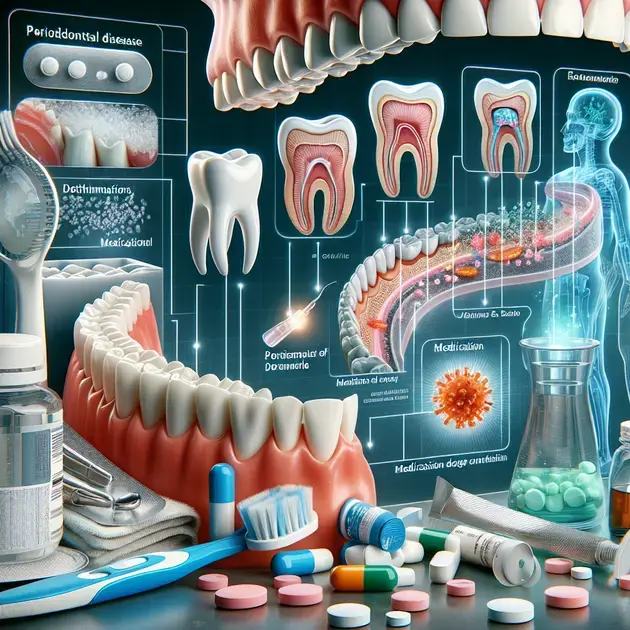Searching for the best medication for periodontitis can be overwhelming with the multitude of options available in the market. From mouthwashes to antibiotics, finding the most effective treatment can be challenging. In this comprehensive guide, we will explore the various medications recommended by experts to combat periodontal disease.
Periodontitis, also known as gum disease, is a common condition that affects millions of people worldwide. It is essential to seek professional advice to determine the most suitable medication for your specific case. With the right treatment and oral care routine, you can effectively manage and prevent the progression of periodontitis.

Expert-Recommended Medications for Periodontitis
Periodontitis is a serious gum infection that can lead to tooth loss if left untreated. In addition to professional dental treatments, experts recommend certain medications to help manage the symptoms and progression of the disease. These medications are typically prescribed by dentists or periodontists and can be an important part of a comprehensive treatment plan.
One of the most commonly recommended medications for periodontitis is an antimicrobial mouthwash. This type of mouthwash contains ingredients that can help reduce the levels of bacteria in the mouth, which can in turn lessen inflammation and promote healing of the gums. Examples of antimicrobial mouthwashes that are often recommended for periodontitis include Listerine and Colgate Total.
In addition to mouthwash, dentists may also prescribe antibiotics to treat periodontitis. Antibiotics such as doxycycline or minocycline can help target and eliminate the bacteria causing the infection. These medications are usually prescribed for a specific period of time and may be used in conjunction with other treatments, such as scaling and root planing.
For more severe cases of periodontitis, dentists may recommend the use of prescription-strength antimicrobial gels or chips. These products are placed directly into the pockets of the gums, where they can release medication over time to help combat the infection. Examples of these products include Arestin and PerioChip.
It’s important to note that the choice of medication for periodontitis should be based on a thorough evaluation by a dental professional. The type and severity of the infection, as well as the patient’s overall health and medical history, will all play a role in determining the most appropriate treatment plan.
Understanding Periodontitis and Its Impact
Periodontitis is a chronic inflammatory condition that affects the gums and bone supporting the teeth. If left untreated, periodontitis can lead to serious complications, including tooth loss and an increased risk of systemic health issues such as heart disease and diabetes. Understanding the basics of periodontitis and its impact is crucial for effectively managing the disease and preserving oral health.
The first step in understanding periodontitis is knowing its causes. The condition is primarily caused by the buildup of plaque – a sticky film of bacteria – on the teeth and gums. Over time, if the plaque is not removed through proper oral hygiene practices, it can harden into tartar and lead to gum inflammation. This inflammation, if left unchecked, can progress to periodontitis.
Common symptoms of periodontitis include red, swollen gums, persistent bad breath, and loose or shifting teeth. If you experience any of these symptoms, it’s important to see a dental professional for a thorough evaluation and diagnosis. In some cases, specialized tests such as X-rays or periodontal probing may be necessary to assess the extent of the disease.
Managing periodontitis typically involves a combination of professional treatments and at-home care. In addition to regular dental cleanings and periodontal maintenance appointments, patients with periodontitis may be advised to improve their oral hygiene habits, quit smoking if applicable, and make dietary changes to support gum health.
By understanding the causes and impact of periodontitis, individuals can take proactive steps to prevent and manage the disease. Early detection and treatment are key to avoiding complications and preserving the health of the gums and teeth.
Effective Strategies for Managing Periodontal Disease
Periodontal disease, including periodontitis, requires a comprehensive approach to management in order to control the infection and prevent further damage to the gums and supporting structures of the teeth. In addition to professional treatments and medications, there are several effective strategies that can help individuals manage periodontal disease and promote oral health.
One of the most important strategies for managing periodontal disease is maintaining optimal oral hygiene. This includes brushing the teeth at least twice a day, flossing daily, and using an antimicrobial mouthwash as recommended by a dental professional. Proper oral hygiene can help control the growth of bacteria in the mouth and reduce the risk of gum inflammation.
Another key strategy for managing periodontal disease is quitting smoking. Smoking is a major risk factor for the development and progression of periodontitis, as it can impair the body’s immune response and reduce the effectiveness of periodontal treatments. Quitting smoking can significantly improve the success of periodontal therapy and help prevent future complications.
Regular dental check-ups and cleanings are essential for individuals with periodontal disease. Routine appointments allow dental professionals to monitor the progress of the disease, provide specialized treatments such as scaling and root planing, and offer guidance on at-home care. Patients with periodontal disease should adhere to a personalized treatment plan developed in collaboration with their dentist or periodontist.
In some cases, lifestyle changes such as adopting a healthy diet and managing stress can also contribute to the effective management of periodontal disease. A balanced diet rich in essential nutrients can support gum health, while stress-reducing techniques such as mindfulness or relaxation exercises can help decrease inflammation and promote healing.
By incorporating these effective strategies into their daily routine, individuals can take an active role in managing periodontal disease and improving their oral health outcomes. Working closely with a dental professional is key to developing a personalized treatment plan that addresses the unique needs and challenges of each patient.

Expert-Recommended Medications for Gum Disease
When it comes to treating gum disease, experts often recommend specific medications to help combat the infection and promote healing. These medications may include antibiotics, antiseptic mouthwashes, and prescription-strength toothpaste. Antibiotics such as doxycycline or minocycline are commonly prescribed to target the bacteria causing the gum disease. These medications can help reduce inflammation and control the infection within the gums.
Antiseptic mouthwashes containing chlorhexidine are also recommended by experts for their ability to reduce plaque and bacteria in the mouth. These mouthwashes can be used as a supplement to regular brushing and flossing to help improve gum health. Prescription-strength toothpaste may also be advised by dentists to provide additional protection against plaque and tartar buildup.
It’s important to follow your dentist’s recommendations when using these medications for gum disease. Proper usage and dosage are crucial for effectively treating the infection and preventing further complications. Be sure to also maintain good oral hygiene practices and attend regular dental check-ups to monitor your gum health and adjust the treatment plan as needed.
Overall, expert-recommended medications for gum disease play a critical role in managing and improving oral health. By following your dentist’s advice and incorporating these medications into your oral care routine, you can effectively combat gum disease and maintain a healthy smile for years to come.
Understanding Gum Health and Its Implications
Having a thorough understanding of gum health is essential for maintaining overall oral health and well-being. Gum health refers to the condition of the tissues that surround and support the teeth, including the gums, ligaments, and bone. When the gums are healthy, they are pink, firm, and do not bleed during brushing or flossing. However, if gum disease is present, the gums may become inflamed, swollen, and prone to bleeding.
It’s important to recognize the implications of poor gum health, as untreated gum disease can lead to serious consequences such as tooth loss, bone damage, and systemic health issues. Bacteria from infected gums can enter the bloodstream and contribute to conditions like heart disease, diabetes, and respiratory infections. Maintaining healthy gums through proper oral hygiene and regular dental visits is crucial for preventing these complications.
Regularly monitoring your gum health and addressing any signs of gum disease early on can help prevent further damage and improve overall oral health. Brushing twice a day, flossing daily, and using an antiseptic mouthwash can help keep your gums healthy and reduce the risk of infection. If you notice any changes in your gum health, such as redness, swelling, or bleeding, be sure to consult your dentist for evaluation and treatment.
In conclusion, understanding gum health and its implications is fundamental for preserving your smile and overall health. By prioritizing gum health and taking proactive measures to prevent gum disease, you can enjoy a lifetime of strong teeth and healthy gums.
Strategies for Optimal Management of Oral Health
Optimal management of oral health involves a combination of regular dental care, proper oral hygiene practices, and healthy lifestyle habits. By following various strategies, you can effectively maintain your oral health and prevent common dental issues such as gum disease, cavities, and tooth decay.
First and foremost, it’s essential to brush your teeth at least twice a day with fluoride toothpaste and a soft-bristled toothbrush. Brushing helps remove plaque and bacteria from the teeth and gums, reducing the risk of dental problems. Flossing daily is also crucial for cleaning between the teeth where toothbrushes cannot reach.
In addition to daily oral hygiene practices, visiting your dentist for regular check-ups and cleanings is vital for detecting and addressing any oral health issues early on. Your dentist can provide professional cleanings, dental exams, and personalized treatment plans to keep your teeth and gums healthy.
Furthermore, maintaining a balanced diet and avoiding sugary snacks and beverages can help prevent cavities and promote overall oral health. Eating nutritious foods rich in vitamins and minerals can strengthen your teeth and gums, while avoiding harmful substances like tobacco and excessive alcohol can protect against oral cancer and gum disease.
By incorporating these strategies into your daily routine and prioritizing your oral health, you can achieve optimal management of your oral health and enjoy a bright, healthy smile for years to come.
Conclusion
Expert-recommended medications play a crucial role in managing gum disease and improving oral health. Antibiotics like doxycycline and antiseptic mouthwashes containing chlorhexidine are commonly advised to combat infections and reduce inflammation. Following your dentist’s guidance on proper usage and dosage, alongside maintaining good oral hygiene practices, is essential for effective treatment and prevention of complications.
Understanding gum health is paramount for overall well-being. Healthy gums are firm, pink, and do not bleed, while untreated gum disease can lead to severe consequences such as tooth loss and systemic health issues like heart disease and diabetes. By prioritizing gum health through regular monitoring, proper hygiene, and prompt dental evaluation, you can preserve your smile and prevent gum disease complications.
Optimal management of oral health involves a multi-faceted approach, including regular dental care, daily brushing and flossing, and a balanced diet. Visiting your dentist for check-ups and cleanings, along with avoiding sugary snacks and harmful substances, can help prevent cavities and promote strong teeth and gums. By incorporating these strategies into your routine, you can achieve optimal oral health and maintain a bright, healthy smile for years to come.



